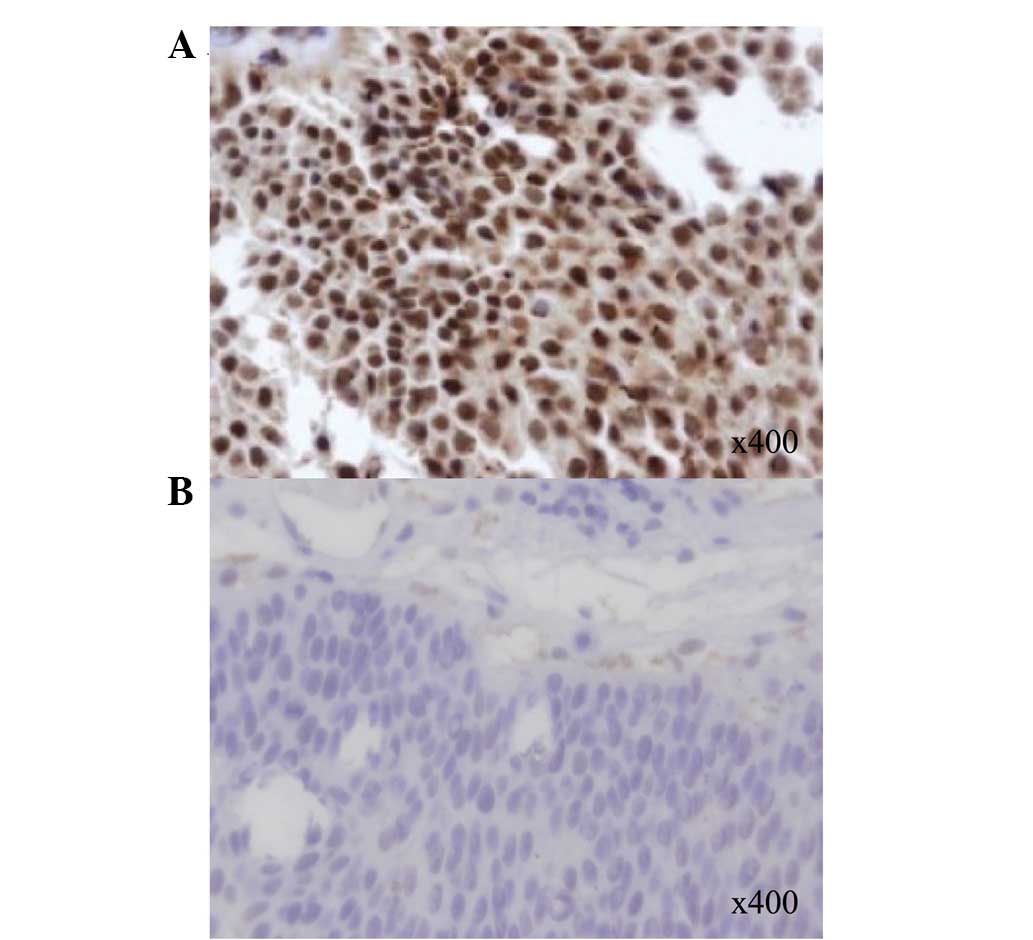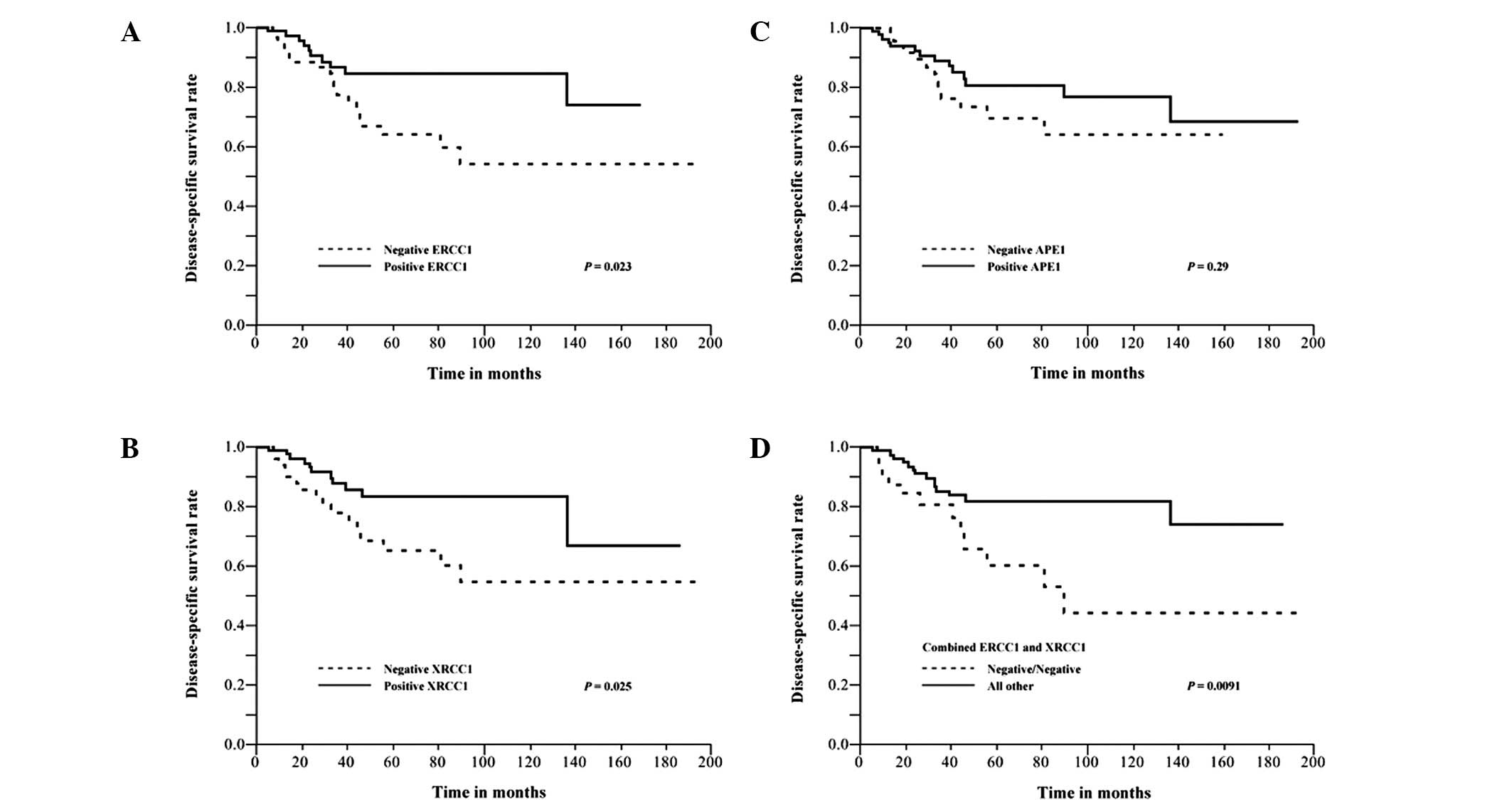|
1.
|
Rödel C, Grabenbauer GG, Kühn R, et al:
Combined-modality treatment and selective organ preservation in
invasive bladder cancer: long-term results. J Clin Oncol.
20:3061–3071. 2002.PubMed/NCBI
|
|
2.
|
Tester W, Caplan R, Heaney J, et al:
Neoadjuvant combined modality program with selective organ
preservation for invasive bladder cancer: results of Radiation
Therapy Oncology Group phase II trial 8802. J Clin Oncol.
14:119–126. 1996.
|
|
3.
|
Kachnic LA, Kaufman DS, Heney NM, et al:
Bladder preservation by combined modality therapy for invasive
bladder cancer. J Clin Oncol. 15:1022–1029. 1997.PubMed/NCBI
|
|
4.
|
Dunst J, Rödel C, Zietman A, Schrott KM,
Sauer R and Shipley WU: Bladder preservation in muscle-invasive
bladder cancer by conservative surgery and radiochemotherapy. Semin
Surg Oncol. 20:24–32. 2001. View
Article : Google Scholar : PubMed/NCBI
|
|
5.
|
Lee CT, Madii R, Daignault S, et al:
Cystectomy delay more than 3 months from initial bladder cancer
diagnosis results in decreased disease specific and overall
survival. J Urol. 175:1262–1267. 2006. View Article : Google Scholar
|
|
6.
|
Rabik CA and Dolan ME: Molecular
mechanisms of resistance and toxicity associated with platinating
agents. Cancer Treat Rev. 33:9–23. 2007. View Article : Google Scholar : PubMed/NCBI
|
|
7.
|
Martin LP, Hamilton TC and Schilder RJ:
Platinum resistance: the role of DNA repair pathways. Clin Cancer
Res. 14:1291–1295. 2008. View Article : Google Scholar : PubMed/NCBI
|
|
8.
|
Metzger R, Bollschweiler E, Hölscher AH
and Warnecke-Eberz U: ERCC1: impact in multimodality treatment of
upper gastrointestinal cancer. Future Oncol. 6:1735–1749. 2010.
View Article : Google Scholar : PubMed/NCBI
|
|
9.
|
Olaussen KA, Dunant A, Fouret P, et al:
DNA repair by ERCC1 in non-small-cell lung cancer and
cisplatin-based adjuvant chemotherapy. N Engl J Med. 355:983–991.
2006. View Article : Google Scholar : PubMed/NCBI
|
|
10.
|
Sak SC, Harnden P, Johnston CF, Paul AB
and Kiltie AE: APE1 and XRCC1 protein expression levels predict
cancer-specific survival following radical radiotherapy in bladder
cancer. Clin Cancer Res. 11:6205–6211. 2005. View Article : Google Scholar
|
|
11.
|
Hu JJ, Smith TR, Miller MS, Mohrenweiser
HW, Golden A and Case LD: Amino acid substitution variants of APE1
and XRCC1 genes associated with ionizing radiation sensitivity.
Carcinogenesis. 22:917–922. 2001. View Article : Google Scholar : PubMed/NCBI
|
|
12.
|
Thompson LH and West MG: XRCC1 keeps DNA
from getting stranded. Mutat Res. 459:1–18. 2000. View Article : Google Scholar : PubMed/NCBI
|
|
13.
|
Ramana CV, Boldogh I, Izumi T and Mitra S:
Activation of apurinic/apyrimidinic endonuclease in human cells by
reactive oxygen species and its correlation with their adaptive
response to genotoxicity of free radicals. Proc Natl Acad Sci USA.
95:5061–5066. 1998. View Article : Google Scholar
|
|
14.
|
Chang-Claude J, Popanda O, Tan XL, et al:
Association between polymorphisms in the DNA repair genes, XRCC1,
APE1, and XPD and acute side effects of radiotherapy in breast
cancer patients. Clin Cancer Res. 11:4802–4809. 2005. View Article : Google Scholar : PubMed/NCBI
|
|
15.
|
Jun HJ, Ahn MJ, Kim HS, et al: ERCC1
expression as a predictive marker of squamous cell carcinoma of the
head and neck treated with cisplatin-based concurrent
chemoradiation. Br J Cancer. 99:167–172. 2008. View Article : Google Scholar : PubMed/NCBI
|
|
16.
|
Weiss C, Wolze C, Engehausen DG, et al:
Radiochemotherapy after transurethral resection for high-risk T1
bladder cancer: an alternative to intravesical therapy or early
cystectomy? J Clin Oncol. 24:2318–2324. 2006. View Article : Google Scholar
|
|
17.
|
Shipley WU, Prout GR Jr, Einstein AB, et
al: Treatment of invasive bladder cancer by cisplatin and radiation
in patients unsuited for surgery. JAMA. 258:931–935. 1987.
View Article : Google Scholar : PubMed/NCBI
|
|
18.
|
Sakano S, Wada T, Matsumoto H, et al:
Single nucleotide polymorphisms in DNA repair genes might be
prognostic factors in muscle-invasive bladder cancer patients
treated with chemoradiotherapy. Br J Cancer. 95:561–570. 2006.
View Article : Google Scholar
|
|
19.
|
Shinohara A, Sakano S, Hinoda Y, et al:
Association of TP53 and MDM2 polymorphisms with survival in bladder
cancer patients treated with chemoradiotherapy. Cancer Sci.
100:2376–2382. 2009. View Article : Google Scholar : PubMed/NCBI
|
|
20.
|
Sakano S, Hinoda Y, Sasaki M, et al:
Nucleotide excision repair gene polymorphisms may predict acute
toxicity in patients treated with chemoradiotherapy for bladder
cancer. Pharmacogenomics. 11:1377–1387. 2010. View Article : Google Scholar : PubMed/NCBI
|
|
21.
|
Sakano S, Matsumoto H, Yamamoto Y, et al:
Association between DNA repair gene polymorphisms and p53
alterations in Japanese patients with muscle-invasive bladder
cancer. Pathobiology. 73:295–303. 2006. View Article : Google Scholar : PubMed/NCBI
|
|
22.
|
Mohrenweiser HW, Carrano AV, Fertitta A,
et al: Refined mapping of the three DNA repair genes, ERCC1, ERCC2,
and XRCC1, on human chromosome 19. Cytogenet Cell Genet. 52:11–14.
1989. View Article : Google Scholar : PubMed/NCBI
|
|
23.
|
Liang J, Jiang T, Yao RY, Liu ZM, Lv HY
and Qi WW: The combination of ERCC1 and XRCC1 gene polymorphisms
better predicts clinical outcome to oxaliplatin-based chemotherapy
in metastatic colorectal cancer. Cancer Chemother Pharmacol.
66:493–500. 2010. View Article : Google Scholar : PubMed/NCBI
|
|
24.
|
Bamias A, Karina M, Papakostas P, et al: A
randomized phase III study of adjuvant platinum/docetaxel
chemotherapy with or without radiation therapy in patients with
gastric cancer. Cancer Chemother Pharmacol. 65:1009–1021. 2010.
View Article : Google Scholar
|
|
25.
|
Simon GR, Sharma S, Cantor A, Smith P and
Bepler G: ERCC1 expression is a predictor of survival in resected
patients with non-small cell lung cancer. Chest. 127:978–983. 2005.
View Article : Google Scholar : PubMed/NCBI
|
|
26.
|
Coffey JC, Wang JH, Smith MJ,
Bouchier-Hayes D, Cotter TG and Redmond HP: Excisional surgery for
cancer cure: therapy at a cost. Lancet Oncol. 4:760–768. 2003.
View Article : Google Scholar : PubMed/NCBI
|
|
27.
|
Sergeant G, Roskams T, van Pelt J,
Houtmeyers F, Aerts R and Topal B: Perioperative cancer cell
dissemination detected with a real-time RT-PCR assay for EpCAM is
not associated with worse prognosis in pancreatic ductal
adenocarcinoma. BMC Cancer. 11:472011. View Article : Google Scholar : PubMed/NCBI
|
|
28.
|
De Castro G Jr, Pasini FS, Siqueira SA, et
al: ERCC1 protein, mRNA expression and T19007C polymorphism as
prognostic markers in head and neck squamous cell carcinoma
patients treated with surgery and adjuvant cisplatin-based
chemoradiation. Oncol Rep. 25:693–699. 2011.PubMed/NCBI
|
|
29.
|
Gazdar AF: DNA repair and survival in lung
cancer - the two faces of Janus. N Engl J Med. 356:771–773. 2007.
View Article : Google Scholar : PubMed/NCBI
|
|
30.
|
Bellmunt J, Paz-Ares L, Cuello M, et al:
Gene expression of ERCC1 as a novel prognostic marker in advanced
bladder cancer patients receiving cisplatin-based chemotherapy. Ann
Oncol. 18:522–528. 2007. View Article : Google Scholar : PubMed/NCBI
|
|
31.
|
Matsumura N, Nakamura Y, Kohjimoto Y, et
al: The prognostic significance of human equilibrative nucleoside
transporter 1 expression in patients with metastatic bladder cancer
treated with gemcitabine-cisplatin-based combination chemotherapy.
BJU Int. 108:E110–E116. 2011. View Article : Google Scholar
|
|
32.
|
Hoffmann AC, Wild P, Leicht C, et al: MDR1
and ERCC1 expression predict outcome of patients with locally
advanced bladder cancer receiving adjuvant chemotherapy. Neoplasia.
12:628–636. 2010.PubMed/NCBI
|
|
33.
|
Kawashima A, Nakayama M, Kakuta Y, et al:
Excision repair cross-complementing group 1 may predict the
efficacy of chemoradiation therapy for muscle-invasive bladder
cancer. Clin Cancer Res. 17:2561–2569. 2011. View Article : Google Scholar : PubMed/NCBI
|
|
34.
|
Zhang Y, Rohde LH and Wu H: Involvement of
nucleotide excision and mismatch repair mechanisms in double strand
break repair. Curr Genomics. 10:250–258. 2009. View Article : Google Scholar : PubMed/NCBI
|
|
35.
|
Herrera M, Dominguez G, Garcia JM, et al:
Differences in repair of DNA cross-links between lymphocytes and
epithelial tumor cells from colon cancer patients measured in vitro
with the comet assay. Clin Cancer Res. 15:5466–5472. 2009.
View Article : Google Scholar : PubMed/NCBI
|
















